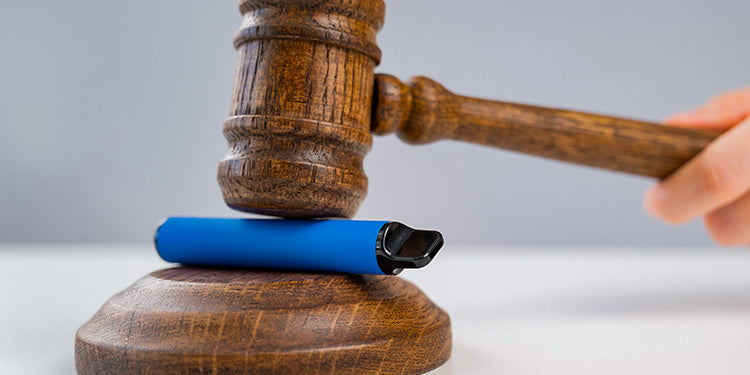
Is the Disposable Vape Ban Working?
The UK has banned disposable vapes. But is the ban working, or simply shifting the problem elsewhere?
Ideally, we’ll be seeing less waste and a fall in youth vaping rates. However, there is also the potential for unintended consequences: illicit sales replacing legal sales and some people switching back to cigarettes.
It’ll take time for the bigger picture to become clear. But one early sign shows that the ban is helping to reduce waste.

Increasing demand for prefilled vape pods is good news
As the ban approached, manufacturers began producing devices that resembled disposable devices but could be recharged and paired with prefilled pods.
One concern was that people would use these kits as single use vapes.
But our data shows a different story.
Purchases of prefilled pods are over five times higher than sales of prefilled pod kits. This suggests many vapers are holding onto their devices and reusing them.

The IBVTA is seeing a similar pattern from across their members, who represent much of the specialist vape sector.
That’s despite shortages of replacement pods for some key brands, likely because brands underestimated post-ban demand for prefilled pods.
Supply is now stabilising, which should boost prefilled pod sales - and help further reduce waste.

The illicit market could still be a problem
Not every signal is positive, and illegal sales are undermining the ban.
Indeed, just a week after the ban an estimated one million pounds worth of disposable vapes were sold (1). Meanwhile, when the Financial Times visited shops in London, they found one in three was still selling single-use vapes. (2)
There have also been numerous reports of disposable vape seizures, such as those in Luton (3) and Wales (4).
Anecdotal evidence from our own retail staff and customers also suggests that illegal disposable vapes remain easy to obtain - often sold under the counter in convenience stores and mobile phone shops.
That all sounds alarming, but it needs context. Prior to the ban five million disposable vapes were discarded every week. One million pounds in sales, while still significant, is a fraction of what was sold before.

How we could do better
Increased pod sales - and fewer kit sales - clearly show that the disposable ban is reducing the amount of waste.
At the same time, more can be done.
The typical government reflex here is to pass more laws. But the problems stem not from a lack of laws, but from a lack of compliance.
While Trading Standards are doing their best, a £200 fine for selling illicit vapes is clearly insufficient. The cost is minimal compared to potential profits, and fails to cover enforcement action and recycling of seized vapes.
Indeed, a team member at one of our retail stores described a nearby shop that’s been raided four times for selling illegal vapes - and is still selling them today.
Our staff have also reported that the same retailers selling illegal vapes are the ones selling to children.
If we want to tackle illegal vapes and youth vaping, it’s time to take enforcement seriously.
Increased penalties, with any financial proceeds being directed to underfunded enforcement agencies, could help immensely.
Illegal pods aren’t the only issue. A month after the ban came into place, an ITV investigation found that some non-specialist retailers were still selling vape kits without selling compatible pods. (5)
These shops need to be encouraged to sell those compatible pods. With pod supply now normalising and demand for pods increasing, this should be an easy fix.
Finally, we should also persuade consumers to try refillable devices to cut waste and cost. Many specialist retailers already do this, but a broader campaign could help reach more people.

It’s not just about waste
Finally, let’s not forget to look beyond waste.
For all their flaws, disposable vapes helped millions of smokers ditch cigarettes. The biggest risk now is that the disposable ban - alongside new taxation and the Tobacco and Vapes Bill - sends the wrong message: that vaping is just as harmful, or even more harmful, than smoking.
Illicit tobacco remains cheap and widely available. If smokers believe there’s no difference in risk, they won’t switch to vaping, while some former vapers may go back to cigarettes.
Unbalanced media coverage, combined with a government that seems more focused on cracking down on reduced-risk nicotine products than on tackling smoking - a product at least 20 times more deadly - could still lead to a major setback for public health.
Sources:
- https://www.conveniencestore.co.uk/news/c-stores-lose-5m-in-vape-sales-during-first-week-of-disposable-ban/705670.article
- https://www.ft.com/content/ca7b4e7f-738d-4bae-bb65-1e817cd2770f
- https://m.luton.gov.uk/Page/Show/news/Pages/Multiple-operations-lead-to-seizure-of-illegal-cigarettes-and-vapes.aspx
- https://www.itv.com/news/wales/2025-07-31/undercover-filming-shows-disposable-vapes-being-illegally-sold-despite-ban
- https://www.itv.com/news/2025-06-30/vapocalypse-is-the-disposable-vape-ban-a-game-changer-or-a-total-flop